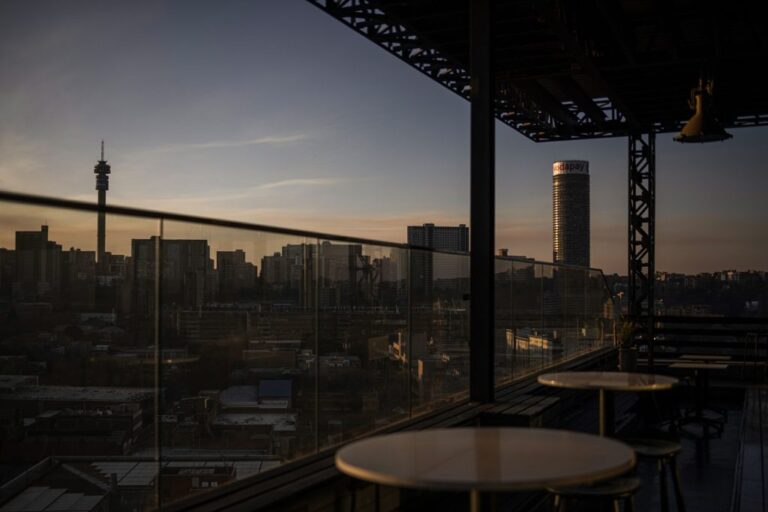You can also listen to this podcast on iono.fm here.
ADVERTISEMENT
CONTINUE READING BELOW
Download the free LiSTN audio app on Google Play, Apple or here.
JEREMY MAGGS: Several civil society organisations have formed a committee, which is calling for President [Cyril] Ramaphosa to intervene to save the City of Johannesburg from what it terms coalition chaos. It includes the Ahmed Kathrada Foundation, as well as the Organisation Undoing Tax Abuse [Outa]. From the foundation, I’m joined now by Neeshan Balton, who is executive director, and in your own words, how chaotic are things?
NEESHAN BALTON: One, in the last few years you’ve had almost six mayors, and remember, Joburg has a mayoral committee system with an executive mayor. That’s the apex of the city governance systems and with that kind of instability and quality of mayors that have been appointed, the results of that are visible for its residents to see.
Listen/read: Joburg needs the finest people to lead the city – Malose Kekana
It is incoherence in policy, incoherence in service delivery and incoherence in terms of an overall vision and plan for the city that takes it out of this crisis and well into the future. The crisis is visible for people to see in their streets, their neighbourhoods, and I suppose in many of the big institutions and facilities of the city. So it’s visible, it’s real, and it’s something that we all feel on a day-to-day basis.
JEREMY MAGGS: Why do you think this has happened? What is the enabling climate, do you think?
NEESHAN BALTON: At our last summit, Ferial Haffajee raised an issue, which I don’t think many of us had understood up until then, was that we have all been looking at state capture at a national level. What we didn’t see was its visibility and presence across cities in the country and more so in a place like Johannesburg.
So I think one is that you’ve seen the city through the board appointments and the qualities thereof and the diversion of resources away from delivery is evidence of what would be called city capture in a sense.
I think secondly is the fractious nature of these coalitions, which are not based on a common vision, but rather I think are coming together to keep each other out, for the ANC to keep the DA out or their coalition to keep the ANC out, but not on a common vision of what is required for the city.
Lastly, would be the quality of people appointed. If you look at the court judgment now and the city manager very, very clearly who’s not qualified for the job and that might well be for many others in the city itself, which then leaves the thousands of others, competent officials who do their jobs diligently at the mercy of either supervisors or managers who probably in many cases don’t meet the criteria.
JEREMY MAGGS: So what sort of intervention are you looking for from the president?
NEESHAN BALTON: Well, one is to acknowledge that this is South Africa’s premier city and when the premier city in the country is in a state of crisis, he must accept that it has national consequences. Failure here has national consequences, as well as continental consequences.
What we are calling on the president is to ensure that together the national government to Cogta [Cooperative Governance and Traditional Affairs], as well as the provincial government here, looks at all of the legal mechanisms to intervene in this crisis.
ADVERTISEMENT
CONTINUE READING BELOW
Listen/read: Alarming literacy levels among local government councillors spark concern
They have a number of different options. They could place the city under the administration, they could change its mayoral committee system or even suspend the entire council and move towards new elections. But all of that needs discussion with broader civil society, needs deliberation with the citizens of this province. But that needs to be done with speed.
JEREMY MAGGS: I can’t help but think that you might be wasting your time though because is municipal politics within the remit of the presidency?
NEESHAN BALTON: I think the power of a metro like Johannesburg, if ignored and for it to collapse completely, would be really beyond the realm of imagination for any political party or even the president to ignore. So I don’t think that they can ignore this crisis. I think you’ve already seen signs of disquiet within the governing party about its coalition options and I think some elements there might be sharing the same concern.
I think the provincial government, when I read a report of the MEC [Member of the Executive Council] local government in this province, it has already rated Joburg as a medium risk. That’s one level below dysfunctionality in terms of their own assessment.
Johannesburg, for this country’s GDP’s performance, is just too critical to allow it to collapse.
JEREMY MAGGS: What happens if the president turns you down?
NEESHAN BALTON: We have a summit on 25 November, the third summit on the crisis in Johannesburg. We will certainly place a response. If it is as negative as that, we will place it to that audience which has thus far been made up of people from across the length and breadth of the city, black and white, rich and poor, formal and informal to then engage with that response and look at what we as residents and ratepayers need to begin to do.
JEREMY MAGGS: I’m going to leave it there. Neeshan Balton, thank you very much for joining me.

